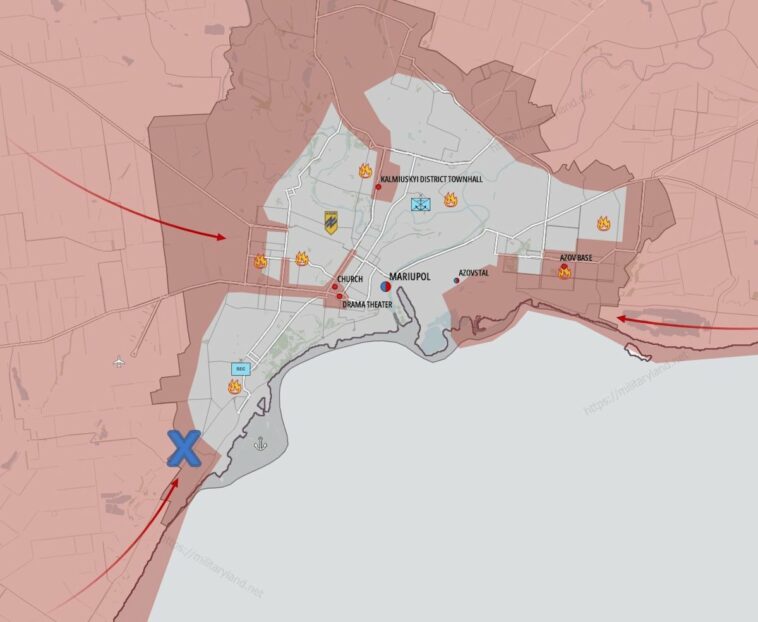Russia expelled from UN Human Rights Council. The United Nations General Assembly suspended Russia from the organization’s Human Rights Council. The resolution passed with 93 votes in favor, and 24 against, and 58 countries abstained, a screenshot of the voting procedure posted by Ukraine’s UN Ambassador Serhiy Kyslytsia shows.
European Parliament adopts resolution calling for full embargo on Russian imports of oil, coal, nuclear fuel and gas. MEPs refer to the shocking atrocities, “that undeniably amount to war crimes”, committed by Russian troops in Ukraine and particularly in Bucha.
They stress that perpetrators of war crimes must be held accountable and call for a special UN tribunal for the crimes in Ukraine to be set up.
Battle for Donbas nears, Foreign Minister Kuleba says. The battle for Donbas will remind of World War II with large operations, maneuvers and thousands of tanks, planes and armored vehicles, Ukraine’s Foreign Minister Dmytro Kuleba said Thursday.
“Russia has its plan, we have ours, and the battlefield will decide the outcome. It is important that our allies do not say that there’s more to figure out. Either you help us now – and I’m speaking about days, not weeks – or your help will come too late, and many people will die,” he told reporters.
Explaining Ukraine: Ukraine’s victory in the battle of Kyiv, stories from Mariupol
Ukraine defeated Russia in the battle of Kyiv, and Russian troops retreated from the Northern, North-Eastern Ukraine, and South-Western Ukraine. On the contrary, Russians are concentrating troops in the East and South. In this episode of “Explaining Ukraine” podcast we are providing updates about the situation on the ground, giving human testimonies from Mariupol and analyzing Russian propaganda. Hosts: Volodymyr Yermolenko, Ukrainian philosopher and journalist, analytics director at Internews Ukraine, and Tetyana Ogarkova, Ukrainian scholar and journalist who is in charge of international outreach at the Ukraine Crisis Media Centre. Listen to the episode.
Ukraine in Flames #28. Should we trust Russian opposition media?
Ukraine and the West are accustomed to dividing the Russian media into two groups: state and liberal. As for the former, everything is more or less clear – after eight years of propaganda, Kiselyov, Soloviev, Simonyan and Skabeeva have become household names to mark the Russian propagandist journalism and are no longer taken seriously by any self-respecting audience.
At the same time, Meduza, Redaktsiya and Novaya Gazeta have been treated with respect, empathy and consideration by the Ukrainian media and readers, while their media management and reporting was considered highly professional. Russian authorities have banned the use of the word “war” in its media space, as well as criminalized “fake news”, meaning any news that does not rely on official state sources. As a result, some liberal Russian media, such as Dozhd, stopped broadcasting, and some were stopped from broadcasting, like Echo of Moscow, at most of the platforms. Russia has officially banned Twitter, Meta and is considering a ban of Youtube, leaving Telegram the only reliable platform for liberal journalism, and all other options unsafe.
It is becoming clear the Russian liberal media succumb to the pressure of state limitations and global canceling. A simple cold calculation can help reconsider former respect and trust for the Russian liberal media. They exist to escape from reality, not to reflect it – and, in many cases, to provide personal escape to the journalists themselves. Russian liberals live in non-existent Russia or outside of Russia, so their assessments do not help make realistic predictions.
They are not Ukraine’s allies in the war, but a tranquilizer for the smart. No doubt, being a professional journalist in Russia can be threatening to one’s life and livelihood. It is out of question, however, that the pressured Russian journalists should be treated by different standards than the Russian people who support Putin. Can independent Russian journalism in Russia remain professional despite following the rules of the Kremlin and covering from outside of Russia?
Speakers:
Maria Avdeeva, Research Director at the European Expert Association
Damian Herbowicz, Editor of the journal “Polityczna”, Poland
Ruslan Deynychenko, CoFounder of StopFake
Oleksandr Holubov, Data Analyst at Deutsche Welle, former journalist at Deutsche Welle (Ukraine)
Mykola Balaban, Deputy Head of the center for Strategic Communications and Information Security




